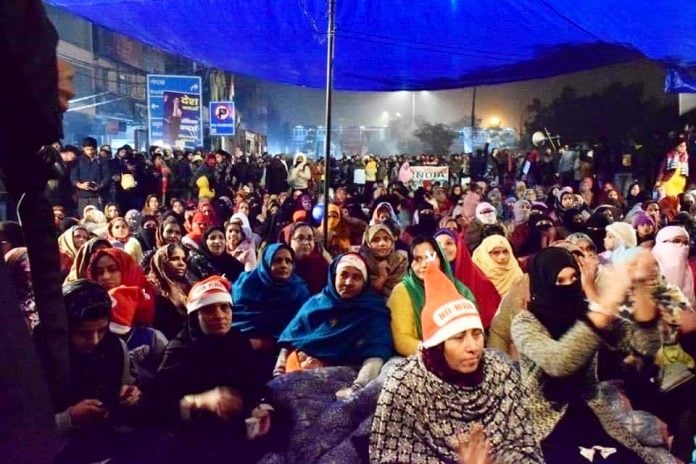By Dilip Bobb
If you want to witness the beating heart of India’s democracy, come to Shaheen Bagh in Delhi. Here, amazing, courageous women have come out in droves to challenge the might of the government and protest against the Citizenship (Amendment) Act (CAA). Camping under open skies and braving the capital’s coldest winter in a century, these protestors, mostly women from neighbouring areas, have turned what was a student’s movement into an inspiring story of indomitable will and a commitment to, in the words of Dylan Thomas, ‘rage against the dying of the light.” The poet was talking about the approach of death but his words carry a deep resonance in this place where the threat of having to prove citizenship has inspired such defiance. Shaheen Bagh represents a crossroad, literally and metaphorically. On one side of the Ring road, are the posh colonies of New Friends Colony and Maharani Bagh, and on the other, areas where the economic and social divide is brutally visible.
On my daily commute from south Delhi to Noida, I was initially irritated at the traffic jams and detours one had to take because of the police barricades put up to limit the protest area which affected the regular Delhi-Noida run. Then, at a post-Christmas lunch, a friend who is something of a social activist said she was going to Shaheen Bagh the next day and invited me to go along. Conscience duly pricked, I agreed and we arrived there around 2 pm on New Year’s Eve to be met with an amazing sight. This was a protest that showed the power of humanity and unity. The crowd was around 800 strong, the only flag visible was the Indian tricolor, and it was an inspirational display of community and harmony—there were volunteers distributing food they had cooked at home, others were handing out blankets or piping hot tea and bottles of mineral water, while the protesters waited for the stroke of the midnight hour when they would all stand as one and sing the National anthem. Listening to the individual stories of strength and sacrifice—a mother with her three children (there was no one to care for them at home), a nearby restaurant owner who had shut his outlet to cook food to feed the protesters—brought tears to my eyes, of joy and gratitude and the hope for a better India that these people represented. More inspiring was the fact that there were no politicians and that this was a spontaneous movement without any leader. It was also entirely and spontaneously peaceful.
Even more inspiring was the way it started. On the night that Delhi police stormed into Jamia Millia Islamia University and attacked students who were merely studying or praying, ten women walked out of their homes and onto the road next door that connects Delhi with Uttar Pradesh. They were quickly joined by other women, ranging from a 90-year-old great grandmother to a young woman with a 20-day-old baby. Gradually, preparations for a long battle began. Tents came up, as did a stage where non-politicians would address the crowd—on the afternoon I was there, I heard Harsh Mander and Yogendra Yadav praise the tenacity of the Shaheen Bagh mothers. The crowd responded with chants of “Hindu-Muslim unity” in response to those who have labeled the protests as being fuelled by radical Islamic elements in cahoots with opposition parties. The women wave anti-CAA placards but the one that is the most powerful is a copy of the Constitution and the frequent readings of the preamble by volunteers. This is a unique moment and a unique movement. The women seated, many holding hands, are inside a protective circle of young men. The menacing presence of the Delhi police is hard to miss. The women are here 24/7, and a screen behind the stage shows documentaries and movies to keep them awake and entertained. This is not, as is being portrayed in some pro-BJP TV channels as a strictly Muslim crowd—when I was there, there were college professors, poets, civil society groups, celebrities and turbaned Sikhs, all non-Muslim and like me, caught up in this moment where, in the words of another poet, a terrible beauty is being born.
Lead picture: Photo source twitter.com/CitizenKamran/status/1211361435231457281


